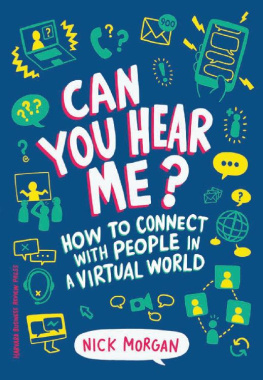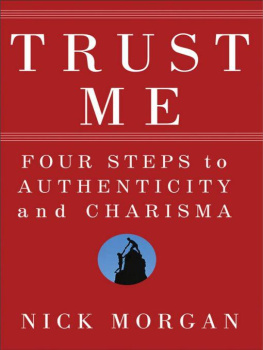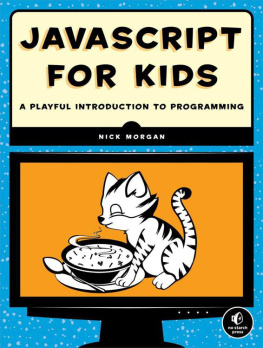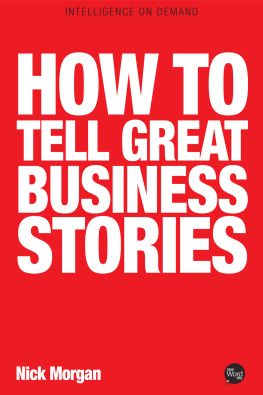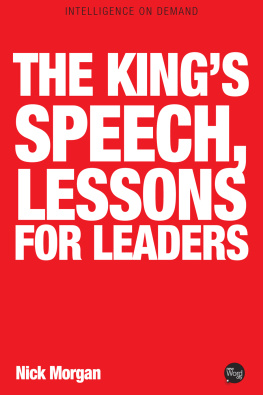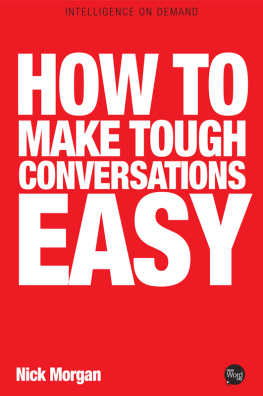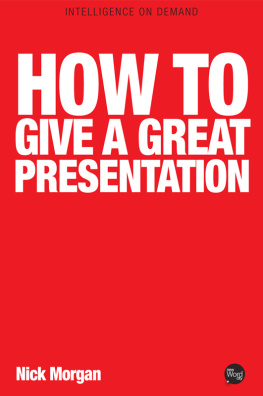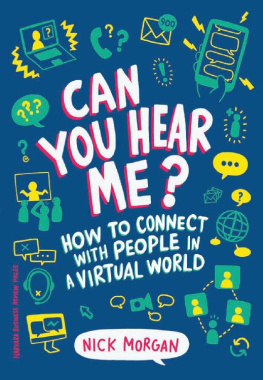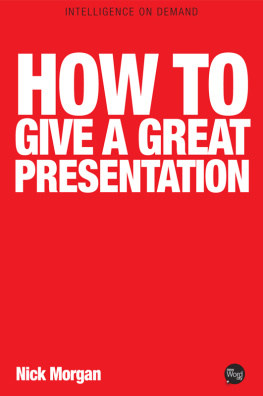Nick Morgan - Can You Hear Me?: How to Connect with People in a Virtual World
Here you can read online Nick Morgan - Can You Hear Me?: How to Connect with People in a Virtual World full text of the book (entire story) in english for free. Download pdf and epub, get meaning, cover and reviews about this ebook. genre: Romance novel. Description of the work, (preface) as well as reviews are available. Best literature library LitArk.com created for fans of good reading and offers a wide selection of genres:
Romance novel
Science fiction
Adventure
Detective
Science
History
Home and family
Prose
Art
Politics
Computer
Non-fiction
Religion
Business
Children
Humor
Choose a favorite category and find really read worthwhile books. Enjoy immersion in the world of imagination, feel the emotions of the characters or learn something new for yourself, make an fascinating discovery.
- Book:Can You Hear Me?: How to Connect with People in a Virtual World
- Author:
- Genre:
- Rating:4 / 5
- Favourites:Add to favourites
- Your mark:
- 80
- 1
- 2
- 3
- 4
- 5
Can You Hear Me?: How to Connect with People in a Virtual World: summary, description and annotation
We offer to read an annotation, description, summary or preface (depends on what the author of the book "Can You Hear Me?: How to Connect with People in a Virtual World" wrote himself). If you haven't found the necessary information about the book — write in the comments, we will try to find it.
Can You Hear Me?: How to Connect with People in a Virtual World — read online for free the complete book (whole text) full work
Below is the text of the book, divided by pages. System saving the place of the last page read, allows you to conveniently read the book "Can You Hear Me?: How to Connect with People in a Virtual World" online for free, without having to search again every time where you left off. Put a bookmark, and you can go to the page where you finished reading at any time.
Font size:
Interval:
Bookmark:


FM.indd 1
13/08/18 12:15 PM
FM.indd 2
13/08/18 12:15 PM
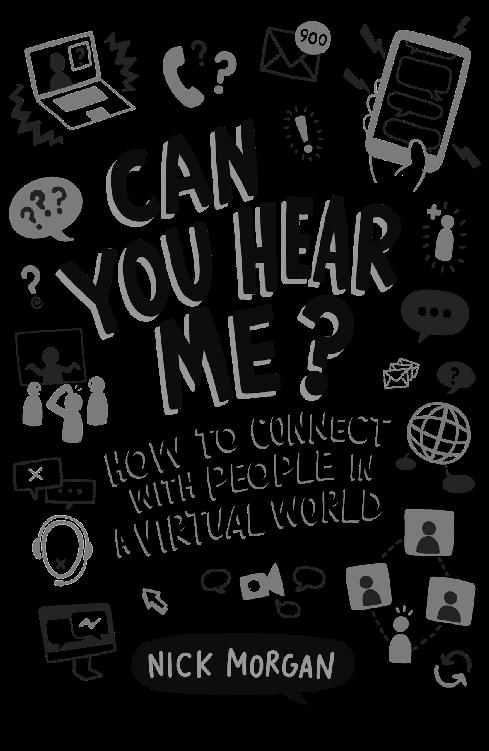
Harvard Business Review Press
Boston, Massachusetts
FM.indd 3
13/08/18 12:15 PM
HBR Press Quantity Sales Discounts Harvard Business Review Press titles are available at significant quantity discounts when purchased in bulk for client gifts, sales promotions, and premiums. Special edi-tions, including books with corporate logos, customized covers, and letters from the company or CEO printed in the front matter, as well as excerpts of existing books, can also be created in large quantities for special needs.
For details and discount information for both print and ebook formats, contact booksales@harvardbusiness.org, tel. 800-988-0886, or www.hbr.org/bulksales.
Copyright 2018 Nicholas H. Morgan
All rights reserved
No part of this publication may be reproduced, stored in or introduced into a retrieval system, or transmitted, in any form, or by any means (electronic, mechanical, photocopying, recording, or otherwise), without the prior permission of the publisher. Requests for permission should be directed to permissions@hbsp.harvard.edu, or mailed to Permissions, Harvard Business School Publishing, 60 Harvard Way, Boston, Massachusetts 02163.
The web addresses referenced in this book were live and correct at the time of the books publication but may be subject to change.
Library of Congress Cataloging-in-Publication Data Names: Morgan, Nick, author.
Title: Can you hear me? : how to connect with people in a virtual world /
Nick Morgan.
Description: Boston, Massachusetts : Harvard Business Review Press, [2018] |
Includes bibliographical references and index.
Identifiers: LCCN 2018037883 | ISBN 9781633694446 (hardcover : alk. paper) Subjects: LCSH: Communication and technology. | Business communication. |
Teleconferencing. | CommunicationPsychological aspects.
Classification: LCC P96.T42 M665 2018 | DDC 302.23/1dc23
LC record available at https://lccn.loc.gov/2018037883
eISBN: 978-1-63369-445-3
FM.indd 4
17/08/18 3:11 PM
To Nikki, the center of my world To Sarah, Eric, Howard, and Emma, bridging old worlds and new
To Lakin, Logan, Eryn, Thaila, and Cyril, knowing only the new
FM.indd 5
13/08/18 12:15 PM
FM.indd 6
13/08/18 12:15 PM
CoNTENTS
Prologue: Is This Thing On?
ix
Introduction
Were More Connected Than Ever, So Why Do I Feel So Alone?
PART ONE
THE FIVE BASIC PRoBLEMS WITH VIRTUAL COMMUNICATIONS
1. The Lack of Feedback
Wheres the emotional clarity?
2. The Lack of Empathy
Wheres the consistency?
3. The Lack of Control
For better or worse, your life online is public 4. The Lack of Emotion
Can you make me care?
5. The Lack of Connection and Commitment 105
Anyone here from Dubuque?
FM.indd 7
13/08/18 12:15 PM
viiiContents
PART TWO
SPECIFIC TECHNIQUES FOR SPECIFIC DIGITAL CHANNELS
6. Email, Email Alternatives, and Texting 127
7. The Conference Call
8. The Webinar
9. The Chat Session
10. Sales
Conclusion
Notes
247
Index
255
Acknowledgments
267
About the Author
269
FM.indd 8
13/08/18 12:15 PM
PROLOGUE
IS THIS THINg ON?
We are all unwitting participants in a massive social experiment that began slowly after World War II and gathered speed in the last decade with the introduction of the smartphone. We have created virtual personas, online worlds, digital connections, social media lives, email relationships, audioconference teams
the whole panoply of ways that we now communicate with one another virtually.
That ability to communicate virtually seemed at first to be an unmitigated advance. We could communicate faster, more easily, with less friction, at our own convenience, to multiples of our previous audiences, with the click of a mouse or a send
button.
Only recently have we started to realize that this huge social experiment has a downside, too. Weve started to worry about shorter attention spans, and we wonder if the internet makes us stupid. But the real downside has remained largely invisible to us because it touches on the workings of our unconscious minds.
FM.indd 9
13/08/18 12:15 PM
xPrologue
As weve made room for virtual communication in our lives, our workplaces, and in all the ways we connect with one another, we havent fully realized how emotionally empty virtual communications are. Every form of virtual communication strips out the emotional subtext of our communications to a greater or lesser extent. Every one.
Take email, for example. Weve all experienced the frustration of sending an email that was (to us) obviously meant to be a joke. But the recipient, instead of being amused, was offended, and we had to spend huge amounts of time repairing the relationship. Thats the simplest, most obvious form of emotional undercutting that virtual communications foist on us.
Most of us have also spent hours on audioconferences at work, with the mute button in force, taking care of other business while people on the other end of the box drone on endlessly.
Weve had to lunge for that mute button when the boss suddenly says, Nick, are you still on? What do you think of the new cross-eyed widget?
And then theres social media, which would seem to be all about emotional connection but in fact is like Pringles potato chips; you need to keep eating them because one chip doesnt satisfy. The bland taste creates a need for more but doesnt allow you to stop. We get one like on Facebook, enjoy a brief hit of pleasure, and crave more. We get social love on Twitter and Instagram, and its just enough to keep us checking our mobile phones hundreds of times per day. In short, weve transferred a surprisingly large amount of our human interactions to the virtual world, and as a result, we no longer get the emotional information, support, and reinforcement we used to get without thinking about it while communicating face-to-face.
FM.indd 10
13/08/18 12:15 PM
Prologuexi
Virtual relationships are more fragile and easily disrupted because they lack the unconscious connections our face-to-face interactions automatically convey. The lift of an eyebrow, the tone of a voice, a quick smile, a shake of the headthese are the ways we decode other peoples intents. These signals are largely absent from all forms of digital communication.
In business, this absence leads to miscommunication, misunderstandings, and a huge amount of do-overs, workarounds, and relationship repair. Its expensive. Its inefficient. And the cost in fractured relationships, missed opportunities, and lost connections is incalculable. Because we make decisions with our emotions, moreover, when we take them out of the communication, the audioconference, or the webinar, it becomes almost impossible to make good decisions when were immersed in the virtual stream.
In our personal lives, the same problems occur, especially when were trying to connect with someone at a distance, virtually. Its expensive in many less quantifiable ways.
Next pageFont size:
Interval:
Bookmark:
Similar books «Can You Hear Me?: How to Connect with People in a Virtual World»
Look at similar books to Can You Hear Me?: How to Connect with People in a Virtual World. We have selected literature similar in name and meaning in the hope of providing readers with more options to find new, interesting, not yet read works.
Discussion, reviews of the book Can You Hear Me?: How to Connect with People in a Virtual World and just readers' own opinions. Leave your comments, write what you think about the work, its meaning or the main characters. Specify what exactly you liked and what you didn't like, and why you think so.

